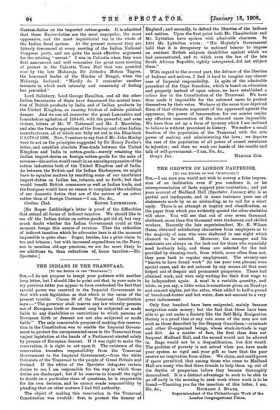THE INDIANS IN THE TRANSVAAL. [To ram EDITOR OP THR
"SPEOTATOR.'1
SIR,—I do not propose to tempt your patience with another long letter, but I should like to point out that in your note to my previous letter you appear to have overlooked the fact that special power was reserved to the Imperial Government to deal with such legislation as that which is the cause of the present trouble. Clause 39 of the Transvaal Constitution says :—" The governor shall reserve any law whereby persons not of European birth or descent may be subjected or made liable to any disabilities or restrictions to which persons of European birth or descent are not also subjected or made liable." The only conceivable purpose of making this reserva- tion in the Constitution was to enable the Imperial Govern- ment to protect the unrepresented races in the Transvaal from unjust legislation at the hands of a Parliament elected solely by persons of European descent. If it was right to make the reservation, it is right to act upon it. The existence of the reservation transfers responsibility from the Transvaal Government to the Imperial Government,—from the white Colonists of the Transvaal to the people of Great Britain and Ireland. If the editor of the Spectator delegates certain duties to me, I am responsible for the way in which those duties are discharged; but if he reserves to himself the right to decide on a particular class of questions, he is responsible for his own decision, and be cannot evade responsibility by pleading that on other matters I had full authority.
The object of making this reservation in the Transvaal Constitution was twofold : first, to protect the honour of England; and secondly, to defend the liberties of the Indians and natives. Upon the first point both Mr. Chamberlain and Mr. Lyttelton have spoken with admirable clearness. In 1904 Mr. Lyttelton wrote : "His Majesty's Government bold that it is derogatory to national honour to impose on resident British subjects disabilities against which we had remonstrated, and to which even the law of the late South African Republic, rightly interpreted, did not subject them."
With regard to the second part, the defence of the liberties of Indians and natives, I find it hard to imagine any clearer 'case of Imperial responsibility. In spite of the admirable precedent of the Cape franchise, which is based on education and property instead of upon colour, we have established a colour line in the Constitution of the Transvaal. We have thus made it impossible for the coloured races to protect themselves by their votes. We have at the same time deprived them of that ultimate argument of the oppressed against the oppressor, the power of insurrection, for our armies render any effective insurrection of the coloured races impossible. We have thus set up a form of tyranny which I am inclined to believe is without precedent in history. We endow a small fraction of the population of the Transvaal with the sole power of making and administering the laws ; we deprive the rest of the population of all power of armed resistance to injustice ; and then we wash our hands of the results and talk of self-government.—I am, Sir, &c.,






































 Previous page
Previous page